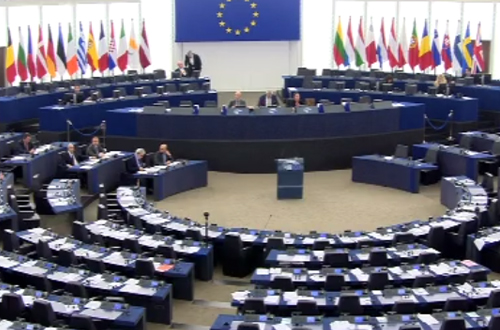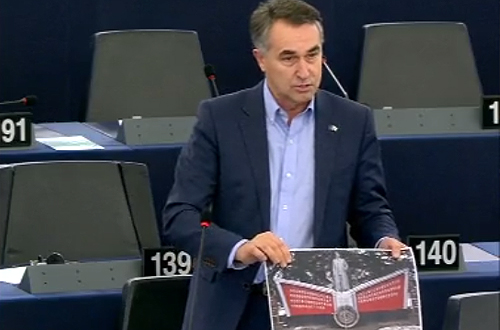| European Parliament Debates on Georgia |
| Civil Georgia, Tbilisi / 26 Nov.'15 / 17:55 |

European Parliament chamber in Strasbourg, November 25, 2015.
The European Parliament discussed situation in Georgia with Rustavi 2 TV case among the most frequently mentioned issues in remarks of those two dozen MEPs who spoke during hour-long debates in Strasbourg on November 25.
MEPs from the major political groups, including those who in their remarks were critical of the Georgian authorities, were voicing support for granting visa free travel rules for Georgian citizens in the Schengen area.
European Commissioner on Humanitarian Aid and Crisis Management Christos Stylianides, who presented the European Commission’s position, said that implementation of the deep and comprehensive free trade agreement as well as approximation of the Georgian legislation with the EU is progressing at “a good pace”. Speaking about “challenges”, the Commissioner noted the need to provide ahead of the next year’s parliamentary elections environment that is “calm and respectful”; he said that the democratic momentum should be maintained and we expect the full respect of the institutions, including of the judiciary and media freedom. He also noted “progress” in judicial reforms and also said that the EU was monitoring trials into high-profile cases, as well as private lawsuit against Rustavi 2 TV. The Commissioner said there are “positive signs” in respect of Georgia’s visa liberalisation process with the EU.
Speaking on behalf of the European People’s Party, the largest group in the European Parliament, Czech MEP Jaromír Štětina said that Georgia made an important step in overcoming its Soviet heritage when it changed the government peacefully and democratically in 2012 elections, but added that it’s difficult to completely get rid of the “burden of Soviet past” and as he said it was demonstrated in “selective justice” and “politicized” prosecutions against former government officials from the UNM party and “unacceptable events” around Rustavi 2 TV.
MEP Štětina also mentioned cases of restoration of statues of Stalin. A statue of Stalin was erected in a village of Shorapani in Guria region in early November by the Soviet dictator’s local sympathizers, but the statue was removed by the local authorities next day. Local city council (Sakrebulo) in Stalin’s birthplace of Gori voted down in early October a proposal to restore the Soviet dictator’s statue in the city center.

Lithuania MEP Petras Auštrevičius shows a photo of Stalin statue in the village of Zemo Alvani in Georgia’s eastern region of Kakheti during debates on Georgia in the European Parliament in Strasbourg, November 25, 2015.
The issue of Stalin statues was also raised by Lithuania MEP Petras Auštrevičius from the group of the Alliance of Liberals and Democrats for Europe (ALDE), who showed a photo of statue of the Soviet dictator in the village of Zemo Alvani, which was re-erected in late 2012 and which still remains there. Condemning restoration of the statue, MEP Auštrevičius then tore the photo up.
Romanian MEP Victor Boştinaru, who spoke on behalf of the group of the Progressive Alliance of Socialists and Democrats (S&D), said that Georgia is a “frontrunner” among EU’s Eastern Partnership countries, which has made “significant progress” in reforms since signing the Association Agreement last year, including in the framework of visa liberalisation action plan and expressed hope that Georgia will be “rewarded” with visa free travel rules in the Schengen area. He also noted importance of securing fair electoral environment and internal political stability. MEP Boştinaru also called on colleagues from the EPP group to “stop playing politically the case of Georgia”, adding that it won’t help the country.
Polish MEP Anna Elżbieta Fotyga of the European Conservatives and Reformists group (ECR) raised the issue of Rustavi 2 TV and “political prisoners”, and said that Georgia should address these problems. She, however, also added that she “strongly” supports EU visa liberalisation for Georgia.
Spanish MEP Javier Nart, who was speaking on behalf of ALDE, said in his remarks that billionaire former PM Bidzina Ivanishvili was in full control of the Georgian government. He also said that the Rustavi 2 TV would be a “litmus test of credibility” for the Georgian authorities. While saying that the country made progress, he also added that there still are “enormous shortcomings”, including in respect of judiciary.
MEP from Finland Heidi Hautala of the group of the Greens/European Free Alliance (Greens/EFA) said that despite of all the challenges and shortcomings, Georgia remains committed to the European future.
“The country is making a great effort and we have to support its European choice, because as we know long shadow of Russia is on every eastern partner country,” said MEP Hautala, who was among those European Parliament members who visited Tbilisi in early November for the first meeting of the EU-Georgia Parliamentary Association Committee.
She also said despite of shortcomings justice reform is ongoing; she also said that the European Parliament should continue paying close attention to the Rustavi 2 case “to show that indeed we are very tough on media freedom and independence of justice system.”
MEP from the UK Sajjad Karim of the ECR group, who co-chaired the first EU-Georgia Parliamentary Association Committee meeting in Tbilisi earlier this month, said during the debates that the next step in EU-Georgia relations should be towards the visa liberalisation. MEP Karim also noted importance for Georgia to show its commitment to the European values and media freedoms, especially ahead of next year’s parliamentary elections.
He also said that during the visit to Georgia it was possible to achieve moving “our relations beyond party political affiliations.” “I think that we will serve ourselves well if future [European Parliament] resolutions build upon the final statement that we were able to achieve [in Tbilisi],” MEP Karim said.
Latvian MEP Andrejs Mamikins from the S&D group, who is a standing rapporteur on Georgia from the European Parliament’s Committee on Foreign Affairs, said that Georgia is ready to complete visa liberalisation process with the EU.
“Georgia has advanced in the implementation of necessary reforms – not less or even much more than Ukraine or Moldova, yet the latter already has the visa free regime,” MEP Mamikins said, adding that reforms carried out by Georgia show that the country “is more than ready to successfully finish” the visa liberalisation process.
Hungarian MEP Tamás Meszerics from the group of the Greens/European Free Alliance mentioned the need of “respecting political opposition as a legitimate rival, which is the sine qua non of democratic politics.”
“And likewise the political opposition is required to understand and work for a peaceful change of government within bounds of democratic politics,” MEP Meszerics added.
MEP from Croatia Andrej Plenković of the EPP group mentioned his remarks “pressure on the opposition” and “political prisoners”; he also noted importance of media freedom, and also expressed hope that visa liberalisation with Georgia will speed up country’s European integration.
Polish MEP from the EPP group Agnieszka Kozłowska-Rajewicz said visa liberalisation would be beneficial both for Georgia and the EU.
Dutch MEP from the S&D group, Kati Piri, said that Georgia “is in many aspects a success story”, but also noted that “even the perception of political interference” with the judiciary and the free press should be avoided. In this respect she said that the case of Rustavi 2 TV “should have been handled differently.”
“But it is likewise worrying how the former president Mikheil Saakashvili tried to instrumentalize this case to instigate unrest,” MEP Piri said, apparently referring to Saakashvili’s discussion of Rustavi 2 TV in leaked wiretapped recordings.
In an obvious reference to ex-PM Bidzina Ivanishvili, MEP Piri said that “the most influential political actor in Georgia is not accountable to anyone.”
Slovak MEP from the EPP group Eduard Kukan urged Georgian leadership “to fight their political battles in the parliament not [through] pre-trial detentions or in jail.”
In his closing remarks by the end of the debate, Commissioner Stylianides said: “We closely monitor whether our shared principles are respected” by Georgia.
He said that during her visit to Georgia this month the EU foreign policy chief Federica Mogherini “was encouraged by the constructive tone taken by the government and parliamentary factions’ leaders.”
“They acknowledge the need to maintain focus on reforms and to create a safe space for campaigning ahead of the next year’s parliamentary elections,” Commission Stylianides said.
On visa liberalisation, the Commissioner said that this process is merit-based and the European Commission will report about how Georgia is implementing reforms envisaged by the visa liberalisation action plan in December.
“Once the final report is issued, the Commission will be in the position to present a legislative proposal to lift visa obligation; then the decision to do so lies with the European Parliament and Council and time that could be needed to decide upon such a proposal is difficult to predict as you know,” Commissioner Stylianides said.
